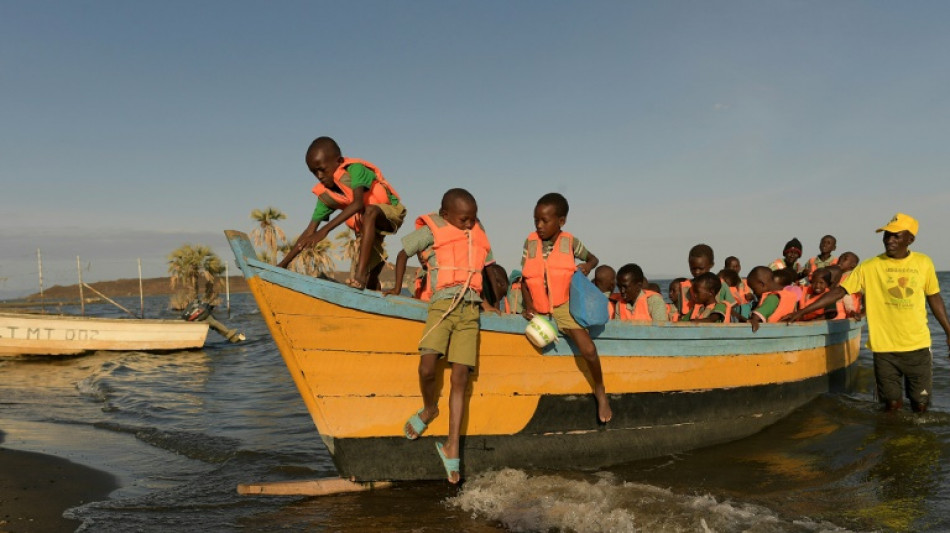
RBGPF
-1.2700

At first light, children from one of Kenya's smallest and most isolated tribes put on life jackets and board a fishing boat for the journey across the lake to school.
Until recently, they could walk the distance. A road connected the El Molo with the world beyond their tiny village, a lifeline for a secluded community of fishers and craftspeople subsisting on the shores of Lake Turkana.
But three years ago the lake started rising dramatically, lapping at the El Molo's dome-shaped huts draped in dry fish, then pushing inland, forcing villagers to higher ground.
As the tide reached levels not seen in living memory, the El Molo watched their only freshwater pipeline slip beneath the surface, as well as the burial mounds of their ancestors.
Eventually, the road to the mainland disappeared completely, marooning the El Molo on an island in a lake so large and imposing it is sometimes called the "Jade Sea".
"There never used to be water here," said El Molo fisherman Julius Akolong as he crossed the wide channel that today separates his community from the rest of far northern Kenya.
"You could drive a jeep across."
Turkana, already the world's largest desert lake, stretching 250 kilometres (155 miles) tip to tip, grew 10 percent in the decade to 2020, according to a government study published last year.
That expansion submerged nearly 800 additional square kilometres (about 300 square miles) of land including around El Molo Bay, where the tribespeople live on Turkana's eastern shores.
Extreme rainfall over catchment areas -– a climatic event linked to global warming -- greater soil runoff from deforestation and farming, and tectonic activity were all cited as contributing causes.
- Blessings and curses -
The phenomenon has profoundly impacted the El Molo, whose distinct Cushitic culture was already under serious threat.
Barely numbering 1,100 in the last census, the El Molo are dwarfed by Kenya's larger and more prosperous ethnic groups that dominate a country of around 50 million people.
Known as "the people who eat fish" by the livestock-rearing tribes of northern Kenya, the El Molo are believed to have migrated from Ethiopia to Turkana around 1,000 BC.
But few today speak a word of their mother tongue, and ancient customs have evolved or vanished entirely through generations of intermarriage with neighbouring ethnic groups.
The lake's unexpected rise fragmented the remaining El Molo still following the old ways of life.
Some displaced in the disaster made the wrenching decision to relocate to the mainland, erecting a squatter camp on the opposite shore.
The cluster of shanties on a barren and wind-swept clearing is nearer to the school and other facilities, but a world away from their tight-knit community and its traditions.
"It was very difficult... We had to go and discuss this with the elders so they could permit or bless us to go with no curses," said Akolong, a 39-year-old father of two.
For those who stayed, life on the island has become a struggle.
The El Molo are skilled fishers, but as Turkana rose higher their people went hungry.
The fishing nets and baskets used for millennia, hand-woven with reeds and doum palm fibre, proved less effective in the deeper water, reducing catch.
No longer able to access freshwater, the El Molo were forced to drink from Turkana, the most saline lake in Africa.
Children in the village suffer chalky teeth and bleached hair, a side effect of the lake's high fluoride content.
"We often get diarrhoea... we have no other clean water. This is all we have. It is salty, and corrodes our teeth and hair," said Anjela Lenapir, a 31-year-old mother of three who decided to stay.
- Disappearing culture -
School attendance has fallen sharply because parents cannot afford the boat fare, said David Lesas, deputy head teacher at El Molo Bay Primary School.
"Most of them remain at home," he lamented.
The local government and World Vision, an aid group, are assisting but resources are scarce and needs many in the region, which is experiencing a once-in-a-generation drought.
The school has suffered too: the perimeter fence and toilet block are underwater, and crocodiles have taken over part of the playground.
But the real damage to the El Molo is indelible.
Separated from his people, Akolong has missed initiation rites, naming ceremonies, and funerals -- rituals that strengthen tribal identity and community.
"We are now divided," he said bitterly.
Stone cairns marking the resting place of El Molo's dead have been swept away, erasing memories of the past, while the lake threatens venerated shrines to tribal deities.
"It is a place that is deeply respected in our culture. With the water rising, we will lose that tradition too," said Lenapir.
K.Dudek--TPP